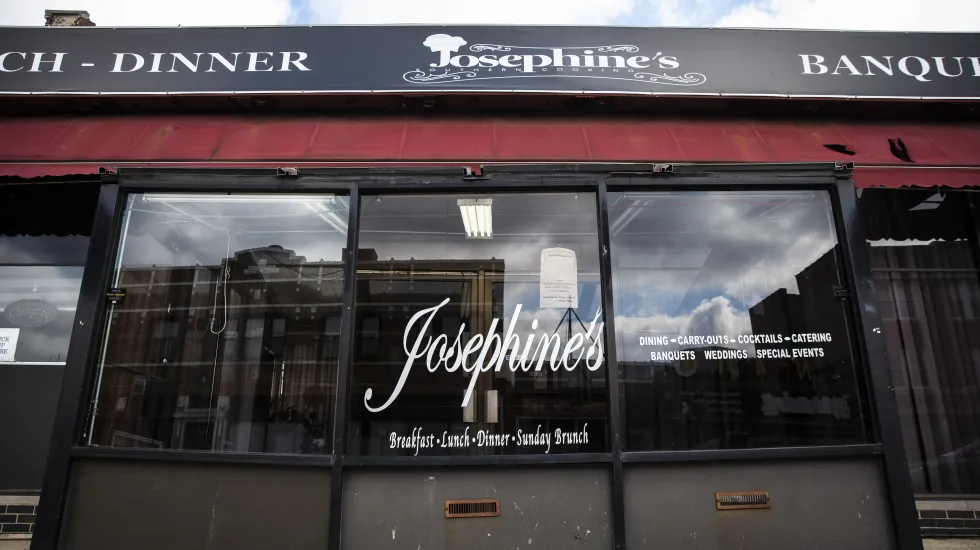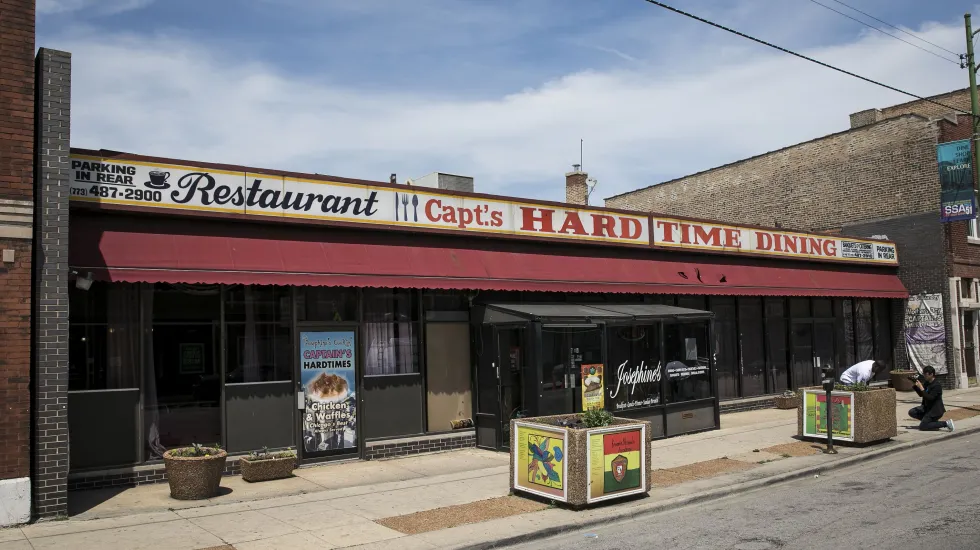
Josephine’s Cooking is a South Side institution, popular among soul food fans and politicians, but records show it hasn’t paid its property taxes in 12 years.
Altogether, the owners — “Mother” Josephine Wade and her son Victor Love — owe more than $500,000 in taxes and penalties.
As a result, they’ve risked losing the property to real estate speculators, who could pay the outstanding taxes and take ownership of the building, potentially evicting the restaurant.
But, for years, that was blocked from happening by the Cook County Land Bank Authority, a county government agency that was established to wipe out delinquent taxes on vacant and abandoned properties to make it easier for them to be bought and redeveloped.
The land bank kept putting in claims for the building, though it never followed through by taking ownership of the property or erasing the property taxes, and it kept dropping its claims.
But that kept anyone from paying the taxes and possibly taking over the property.
That allowed Wade to hang onto the restaurant, which got a TV makeover in 2019 on the Food Network’s “Restaurant: Impossible” as her unpaid taxes at 436 W. 79th St. in Chatham kept piling up.
It isn’t clear why the land bank stepped in at all. Its rules bar the agency from dealing with occupied businesses and homes.
So why did the agency ignore its policies and put in claims on Josephine’s restaurant and several other businesses in Chicago and the suburbs?
“Those are all good questions,” says Cook County Commissioner Bridget Gainer, who, with Cook County Board President Toni Preckwinkle, created the land bank in 2013 and remains president of its board.
Asked about Josephine’s and the other properties by Chicago Sun-Times reporters, Gainer says the land bank now has hired former Cook County Judge Patricia Brown Holmes to conduct a “top-to-bottom” review of policies and procedures for the agency, which the Sun-Times has reported is under federal investigation.

Gainer won’t say why the land bank put in a claim on Josephine’s, dropped it, then did it again.
Records show the restaurant’s delinquent taxes were auctioned in February to the high bidder — an ex-con who owes $1.9 million in restitution after being convicted of selling stolen cellphones.
The tax buyer, Yasin A. Yasin, says he hopes to take ownership but plans to let Josephine’s stay on as a tenant.
“I’m not looking to take away these people’s bread and butter,” Yasin says. “She’s a pillar in the community.”
Wade, 79, says she didn’t know anything about Yasin and his bid for the building that’s housed the restaurant she and her husband opened in the 1980s, known then as Capt.’s Hard Time Dining.
She says she was going to ask her lawyer about her options.
“We do more than sell food,” Wade says. “We do a lot of outreach and helping the homeless, and I’m just tired . . . It’s just been from one disaster to another.”

The restaurant — on a stretch of 79th Street that City Hall has given the honorary name Mother Josephine Wade Way — is popular with politicians.
Gov. J.B. Pritzker spent more than $20,000 on catering by Josephine’s while campaigning in 2018.

Wade’s son, who oversees operations at Josephine’s, has asked Ald. Roderick Sawyer (6th), a longtime friend and regular patron, to help save the restaurant.
Sawyer says he’s not sure he can.
“I was trying to find some investors to help them work through it” before Yasin can petition a judge for the deed, Sawyer says. “It’s a staple of my ward. It’s a center of activity.”

Sawyer and Ald. Carrie Austin (34th) both appeared on “Restaurant: Impossible” to celebrate the big reveal of the renovated restaurant.
Sawyer says he has eaten at Josephine’s with Robert Rose, former executive director of the land bank, who held that post when the agency filed claims for Wade’s and Love’s taxes in 2015 and 2019, effectively blocking anyone else from trying to take ownership.
Rose left the land bank when his contract expired in 2021, as a federal grand jury began investigating the agency. He didn’t respond to messages seeking comment.
When the land bank was created, Gainer said it aimed to help revitalize low-income neighborhoods saddled with vacant properties on which taxes hadn’t been paid for years. Those properties often are tough to get redeveloped because they’re worth less than the amount of taxes that are owed. The land bank has the authority to step in, wipe out the back taxes, then sell these properties to new owners.
Cook County has thousands of such properties. Every year, Cook County Treasurer Maria Pappas holds a tax sale, offering, in effect, an investment opportunity to anyone willing to pay the unpaid taxes from the previous year. If the taxes on a property are bought at the sale, typically by real estate investors, its owner then must repay, with interest, the amount of the previously unpaid taxes. Otherwise, the tax buyer can ask a judge for the deed.
Once taxes go unpaid for three years or longer, the treasurer offers them at a discounted price at a scavenger sale, auctioning them for as little as $250. This year’s sale featured 31,000 properties.
The winning bidders must acquire the deed within four years, or they lose their money, and the unpaid taxes go back to auction at the next scavenger sale.
The only way the property owners can keep their land is by paying all of their unpaid taxes.
The land bank wields a special power at scavenger sales. It can jump the line ahead of anyone else interested in a building, grabbing any property without having to pay anything.
It can hold onto those properties for years, as it has done with Josephine’s.

The restaurant hasn’t paid its property taxes since March 2010, county records show.
The taxes ended up being offered at a scavenger sale, where the land bank claimed the property in January 2016, which kept anyone else from making a bid then or at the next sale, in July 2017.
The land bank returned the property to the county treasurer’s office in July 2018 without taking steps to take ownership.
A year later, it again grabbed the restaurant — along with a vacant lot and another storefront owned by Wade — at the July 2019 scavenger sale.
Then, last August, the agency again walked away from the restaurant without moving to obtain the deed, records show, but kept its claims on Wade’s two other properties.
The land bank’s claims in July 2019 came a few weeks after Wade declared bankruptcy in June 2019.
In her filing for bankruptcy court protection, she disclosed that she owned seven properties in Chicago and listed her biggest debt as a $487,000 judgment for failing to repay the restaurant’s mortgage from Urban Partnership Bank.
The bankruptcy case was dismissed after five months, with most of her debts erased.
Wade had stopped making payments on the loan as well as the restaurant’s taxes in 2010, though she kept filing appeals with the Cook County assessor and the Cook County Board of Review, which reduced the restaurant’s property assessment. That cut its property taxes — which the restaurant still didn’t pay.
Court records show Wade twice has been convicted of financial fraud.
In 2008, the Justice Department filed a lien against her for $219,259 in restitution she owed from a 1993 conviction in a mortgage-fraud case in which she was sentenced to 48 months in prison. She was released on Feb. 27, 1996.
An appellate court ruling said the facts of that case were similar to those in Wade’s earlier conviction, for bank fraud, in 1984, saying both cases “involved Wade submitting false information to lending institutions to induce them to make loans.”
At this year’s scavenger sale, the treasurer auctioned the taxes Wade and her son hadn’t paid on the restaurant from 2009 through 2018 — totaling $435,202. The winning bid came from Yasin, who paid $17,500 in cash.
Yasin, 39 — who went to prison for a federal mail fraud conviction — has four years to ask a Cook County judge for the deed to the restaurant. He would need to pay any outstanding taxes since 2019. The restaurant’s tax bill last year was $25,755.
According to federal court records, Yasin was part of a ring 16 years ago that prosecutors said stole and resold cellphones across the country. He pleaded guilty to mail fraud in 2013 and was sent to prison for 39 months. The judge ordered him to pay $1.9 million in restitution, a debt that remains on the books.
The past five years, Yasin says, he’s been working in construction and development.
Wade’s and her son’s restaurant was one of six properties on which he put in successful tax-sale bids, paying a total of $35,900. The back taxes collectively came to $790,000. The properties previously had been claimed by the land bank and returned to the treasurer’s office.
Yasin says he was working with “a team” to submit claims at the scavenger sale, declining to identify his partners.
Ira Kaufman, his lawyer, says Yasin has worked with his brother-in-law Majdy Joudeh, a developer who has rehabilitated other properties he bought from the land bank.








